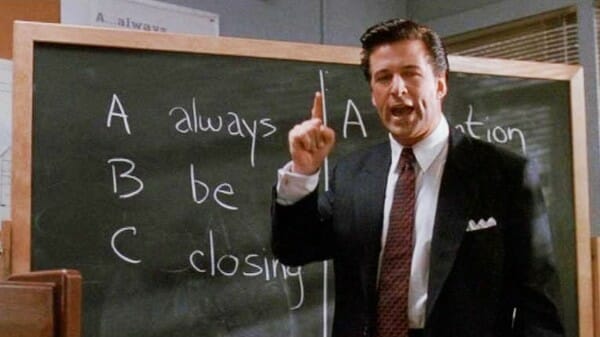
Great salespeople do more than just consistently drive profitable revenue for their employers. They inspire confidence in customers and partners, increase brand trust, and contribute positively to company culture. And these salespeople are rare, representing only 10-15% of the sales population, so when a company has great salespeople, it’s in its best interest to get them to stay. However, a study by Compensation Resources, Inc. (CRI) found that the voluntary turnover rate for salespeople is 15.9 percent, whereas the average rate for other types of employees is 14.3 percent. This study underscores a reality that all executives need to beware of: when salespeople aren’t happy in their organization, they are more willing than other employees to leave.
A high churn rate for a sales team is expensive, and it can negatively affect a sales team’s culture. Great salespeople leave their employers for a reason, and any company that suffers from a high churn rate in the sales department needs to take a deep look at why their talent is departing in order to improve retention rates.
team’s culture. Great salespeople leave their employers for a reason, and any company that suffers from a high churn rate in the sales department needs to take a deep look at why their talent is departing in order to improve retention rates.
In this article we examine the most important reasons why top sales talent decides to leave their current employer and how corporate leaders can mitigate the risks of losing their top performers.
Here are the top 25 reasons great salespeople are leaving your company:
1. Low compensation
In our experience, one of the biggest factors influencing a sales rep’s decision to leave an employer is the feeling that they should be receiving higher compensation for their results. If a salesperson doesn’t see opportunities for increased bonuses, promotions, or raises after being successful year-after-year, then they are likely to move on to a company that can offer a better compensation plan with more room for growth.

“When I look back on the various strategies I used to grow our sales force from zero to several hundred people, I realize that one of the biggest lessons I’ve learned involves the power of a compensation plan to motivate salespeople not only to sell more but to act in ways that support a start-up’s evolving business model and overall strategy,” said Mark Roberge, the fourth employee at HubSpot who built the sales team from the ground up, in an article for the Harvard Business Review.
2. Lack of confidence in offerings
Salespeople who lack confidence in a business’ offerings are unlikely to stay with the company. Anaplan, an enterprise software company, and SiriusDecisions surveyed 400 sales executives to learn why they would leave a company, and found that confidence in the offering portfolio was the top reason that sales executives decided to leave for a new opportunity.
3. Changing compensation plans
Compensation plans vary from company to company, though the standard is to provide reps a plan comprised of a 50% base salary and a 50% commission. However, when executives decide to change compensation plans, it must be done extremely strategically and in consultation with the rep(s) these changes affect. Failing to involve the affected reps and communicate why the changes are happening sends a confusing message to the sales team and can undermine the trust built between reps and their managers.
provide reps a plan comprised of a 50% base salary and a 50% commission. However, when executives decide to change compensation plans, it must be done extremely strategically and in consultation with the rep(s) these changes affect. Failing to involve the affected reps and communicate why the changes are happening sends a confusing message to the sales team and can undermine the trust built between reps and their managers.
“Sudden changes in compensation is one of the biggest red flags a top salesperson can get that their company does not appreciate their contributions or thinks they are making too much money regardless of the beneficial new revenue they are bringing in,” wrote Denise M. Barry, a seasoned sales executive, in an article on LinkedIn Pulse. “This can take the form of a sudden lower salary / higher commission arrangement, or even a surprise doubling of quota.”
4. Reducing the commission rate when reps start close large deals
Salespeople should be rewarded for making more sales, not punished if they’re doing their jobs well. If salespeople are able to close large deals and consistently achieve quota, then they should not see a reduced commission rate because of their success. It may make sense for a sales leader to raise a salesperson’s quota and agree on new sales goals, but reducing the commission rate will frustrate salespeople, and encourage them to explore more financially-rewarding opportunities with other employers.
5. Too much time spent on non-sales activities
It’s estimated that, on average, 32% of a salesperson’s time is spent searching for missing data and entering it into CRMs. This leaves reps to spend only 41% of their time selling, while the remaining 59% of their time is spent on other non-sales activities, such as internal meetings and other administrative tasks. Great salespeople want to sell, and they are likely to leave if they spend most of their time engaged in non-sales activities that limit their sales productivity.
missing data and entering it into CRMs. This leaves reps to spend only 41% of their time selling, while the remaining 59% of their time is spent on other non-sales activities, such as internal meetings and other administrative tasks. Great salespeople want to sell, and they are likely to leave if they spend most of their time engaged in non-sales activities that limit their sales productivity.
6. Unrealistic quota assignments
Although it would seem that salespeople might leave because of their overall earning potential, they are actually more likely to leave because of unrealistic quota assignments, according to research by Anaplan and SiriusDecisions.
If salespeople find their quota assignment unreasonable, expect them to become frustrated and start exploring opportunities elsewhere.
7. Changes in organizational structure without explanation
One of the top five reasons employees resist change is because they ‘fear the unknown’. When organizations overhaul their corporate structure without communicating to the sales force why the change is happening and how it is going to affect their ability to perform, feelings of mistrust and uneasiness can arise among the sales team and cause members to explore new opportunities.
According to Rosabeth Moss Kanter, Professor of Business Administration at Harvard Business School, “The best tool for leaders of change is to understand the predictable, universal sources of resistance in each situation and then strategize around them.”
Executive coach and organizational development expert Lisa Quast recommends that prior to making a major organizational change, managers to carefully think through: 1) what the specific changes include, 2) who the changes will impact, 3) how it will impact them, and 4) how they might react (understanding reasons why people might resist the changes). Knowing this information makes it easier to create a plan of action for a smooth implementation of the changes.
8. Better opportunities elsewhere
Sometimes salespeople leave for reasons that are somewhat beyond an organization’s control. They leave because there are better opportunities elsewhere.
What makes these opportunities more appealing to salespeople who are progressing well in their career? It depends on the salesperson. Some want more autonomy, while others want to substantially increase their compensation plan. Some salespeople may have much more confidence in another organization’s leadership team, or be interested in joining a high growth company with a disruptive offering. And sometimes, salespeople may leave for practical reasons, such as a reduction in their daily commute, or less time spent traveling.
9. Lack of administrative support
If your sales team is spending all of their time in spreadsheets and booking their own flights, then they’re spending less time selling. If they’re not receiving adequate administrative support, and not able to focus their energy on the activities that generate them money, sales leaders should expect their best reps to move on to another company that can offer them the necessary support to excel in their job.

10. Concern about company stability
Great salespeople want to work for a stable organization. Red flags are raised when there are substantial layoffs, issues with investors and key stakeholders, or constant changes in leadership. Salespeople want to be at a company that’s not only stable, but also has a clearly defined future. When a company can’t offer that, it should expect its top sellers to move on.
11. Lack of confidence in leadership
When a CEO, VP of Sales, or other leaders at the top of the organization do not inspire confidence that they will lead the company to achieve its growth targets, then salespeople will be more receptive to hear offers from competing employers. When salespeople see mismanagement and an un-unified vision from their leadership team, they begin to worry about the stability and future of the company, and look for opportunities elsewhere.
“Top salespeople will always struggle with the the sales manager who demands performance verbally, but fails to act in a way that is consistent with those demands. When managers fail to train, or fail to weed out marginal performers, strong players tend to lose trust in leadership.” – Sales Strategist, Leadership Coach, Author, & Speaker, Kelly Riggs
12. Little recognition of performance
Salespeople care about recognition more than any other type of employee, and it’s not just in the form of compensation. These salespeople work day in and day out to help the company succeed, and they want to be recognized and appreciated by peers, managers, and company leaders.
TinyPulse conducted a study on employee retention, and found that employees who didn’t get a lot of recognition and appreciation from their managers were 11% less likely to remain at the company. If your sales team doesn’t get recognized, great salespeople will look for an opportunity where leadership is more likely to express how much they are valued.
13. Lack of promotion opportunities
Great salespeople want more than just a job– they want a career that will provide them with the opportunities to land larger accounts, take over larger territories, and have the opportunity to manage when the time is right. These kinds of opportunities are essential for employee retention and are key considerations top salespeople make when evaluating prospective employers.
14. Little coaching and instruction from sales managers
The best salespeople are always looking for ways to better themselves. Sales managers must take the time to provide reps concrete feedback and coaching on the selling activities and behaviors that lead to better results. If managers don’t provide feedback and coaching, they should expect their best and most promising sellers to start looking at other companies that have better sales leaders.
15. Delays and late payments
Salespeople are motivated by commissions, and if they don’t see their hard work reflected in their bank accounts when they expect it, it will be difficult for them to connect their work to the reward.
“When salespeople succeed, they should see it reflected in their paychecks immediately. When they fail, they should feel the pain in their paychecks immediately,” said Mark Roberge, who built the sales team at HubSpot. “Any delay between good (or bad) behavior and the related financial outcome will decrease the impact of the plan.”
16. Keeping poor performers on board
Poor performers consistently miss their sales targets, aren’t interested in improving their selling abilities, and rely on excuses to mask their underperformance. When sales managers avoid dealing with, or firing, poor performing sales reps, sales culture suffers and the morale of the sales force is eroded. Top sales talent is interested in being part of a sales team that is committed to achieving their sales goals – not one where they are burdened with trying to compensate for their underperforming team members.
17. Inadequate long-term incentives
It’s one thing to give quarterly incentives, but are you providing your sales team with adequate long-term incentives that will make them want to stay around?
Often, salespeople stay with an employer because of the opportunity for yearly bonuses, or the prospect of higher future commissions, or general promotion opportunities. Great salespeople want rewards for the here and now, but they need to know that there will be more incentives in the future. When an executive team cannot clearly define how their the top members of their sales team will be have the opportunity to significantly advance their career, they should expect those top performers to start listening to offers from competing employers.
18. Burnout and overwork
Burnout gets to all employees, and salespeople are perhaps more susceptible to burnout than others. With pressure to meet quotas and long hours at the office and on the road, salespeople can easily get overworked.
Long hours may seem as though they are par for the course, but employees who are tired, burned out, and overworked are 31% more likely to think about looking for a new job than their colleagues who feel comfortable with their workload.
tired, burned out, and overworked are 31% more likely to think about looking for a new job than their colleagues who feel comfortable with their workload.
19. Professional development opportunities
Professional development opportunities are some of the most powerful ways employers can retain their top talent. Providing salespeople access to executive coaches, conferences, and educational courses can make them feel that they’ve found a home at their current company, making them unlikely to move on.
According to TinyPulse’s study, employees with opportunities for professional development were “more than 10% more likely to stay with their current employer.” Many companies offer in-house professional development opportunities along with a budget for educational initiatives.
20. Dysfunctional company culture
According to one study, 75% of people who voluntarily leave their jobs are doing so because of poor culture or poor management. A dysfunctional company culture is one where leadership is constantly changing, negativity defines the office environment, and managers play favorites and promote their friends instead of those who can do the jobs well.
Specifically in sales, an anti-sales culture, or one where corporate leaders have poor views of salespeople, lack empathy, or have inconsistent managerial approach, can significantly impact the desire for a top performer to remain with their employer. Great salespeople will only stick around if they’re apart of a high performing team, and in order to produce high results, it is essential to maintain a pro-sales culture.
views of salespeople, lack empathy, or have inconsistent managerial approach, can significantly impact the desire for a top performer to remain with their employer. Great salespeople will only stick around if they’re apart of a high performing team, and in order to produce high results, it is essential to maintain a pro-sales culture.
21. Poor inter-departmental relationships
Relationships of all kinds have a serious impact on retention, and that is especially true for salespeople, who thrive on social relationships. A salesperson’s relationship with managers, coworkers, those they manage, other corporate leaders, and everyone else in the organization can affect whether they choose to stay at the company or leave for another opportunity.
22. Hiring and promoting of the wrong people
Salespeople are happy when friends and colleagues get promoted, but not when it’s unclear why. When a top salesperson sees a peer that hasn’t had superior sales results get promoted, they’re going to question why and lose respect for their managers and organization as a whole.
23. Too much complexity in the sales process
According to Bain, sales processes in large companies have become more complex and less efficient, resulting in added pressure on profit margins. The study indicates that when B2B companies increase the complexity of their sales models, they typically experience a 40-60% turnover of salespeople.
24. Lack of independence and autonomy
Micromanagement can be defined as a management style which exhibits “a high degree of control with constant attention to small and insignificant details.” TinyPulse’s study found a strong connection between employee job satisfaction and “freedom to make decisions about how to do their jobs.” Employees “whose hands are regularly tied” were found to be 28% more likely to think about leaving their current employer for another.
25. Lack of helpful tools to do the job
Modern salespeople rely on powerful tools like Salesforce to get their jobs done effectively. If the organization isn’t willing to invest in the tools required to help them sell, than salespeople won’t feel valued, and they’ll look to find a better opportunity elsewhere. Salespeople, like any other employee, want to feel valued and appreciated, and having an adequate tool kit at their disposal will show them that their work is important.

Want to mitigate the risk of losing your best salespeople and learn the secrets on how to hire top sales talent? Join the @Peak Executive Email Series:
relpost-thumb-wrapper
Related posts
close relpost-thumb-wrapper
Eliot Burdett
He co-authored Sales Recruiting 2.0, How to Find Top Performing Sales People, Fast and provides regular insights on sales team management and hiring on the Peak Sales Recruiting Blog.
Latest posts by Eliot Burdett (see all)
- 20 Of Our Favorite Books About Sales Management and Sales Leadership – October 20, 2023
- How To Make Progress On Your Sales Goal Without A Sales Leader – September 15, 2021
- Augment Your Recruiting Strategy During “The Great Resignation” – July 26, 2021


















